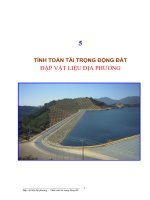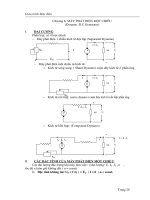PLASTICS ADDITIVESAN INDUSTRIAL GUIDE phần 5 ppt
Bạn đang xem bản rút gọn của tài liệu. Xem và tải ngay bản đầy đủ của tài liệu tại đây (62.5 KB, 2 trang )
Section XXIII
Viscosity Regulators
98 Plastics Additives
Degussa: AEROSIL for PVC Plastisols:
This highly dispersed silica Aerosil has been an established concept
in the plastics industry for years. In many cases where problems of
controlling viscosity such as thickening and thixotropizing must be
solved, Aerosil – thanks to its extremely fine particles and high
chemical purity – has proven very effective. This statement also
applies to the field of PVC plastisols.
Aerosil 200
Aerosil 300
Aerosil 380
Aerosil is a synthetically derived silica which is produced by
hydrolysis of silicon tetrachloride in an oxyhydrogen flame. This
synthesis results in very pure, highly-dispersed silicas, the specific
surface areas of which are used to designate the various grades of the
product. That is, the numbers 200, 300, and 380 indicate that the
particular product has a specific surface area of 200, 300, and 380
m2/g respectively.
Aerosil 200:
Fluffy white powder
BET surface area: m2/g: 200+-25
Average primary particle size: nm: 12
Ignition Loss: %: <1
pH Value: 3.6-4.3
SiO2: %: >99.8
Aerosil 300:
Fluffy white powder
BET surface area: m2/g: 300+-30
Average primary particle size: nm: 7
Ignition Loss: %: <2
pH Value: 3.6-4.3
SiO2: %: >99.8
Aerosil 380:
Fluffy white powder
BET surface area: m2/g: 380+-30
Average primary particle size: nm: 7
Ignition Loss: %: <2.5
pH Value: 3.6-4.3
SiO2: %: >99.8









